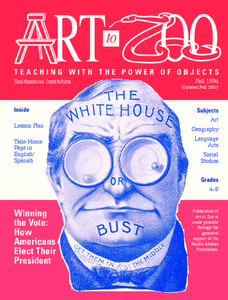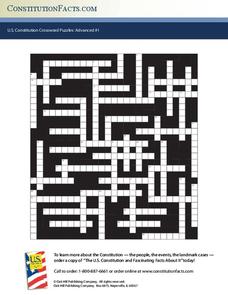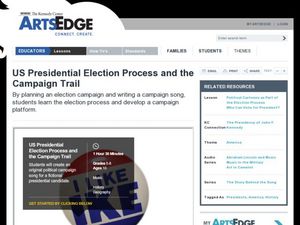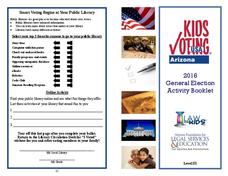Curated OER
Choose or Lose: The Electoral Process
Young scholars examine the local and national election process. In groups, they brainstorm a list of the issues important to them and compare them to an overall list of issues present in the election. They analyze graphs and complete...
Curated OER
Rocking the Vote
Young scholars explore how a presidential candidate can win the popular vote but not receive enough electoral votes to win the election. They analyze various regions' voting trends, explore how these trends reflect the outcome of the...
Constitutional Rights Foundation
The Lincoln-Douglas Debates — Springboard to the White House
The Lincoln-Douglas Debates saw two primary political candidates debating seven different times about one of the most important social movements in United States history. Middle and high schoolers read an article that describes the...
Curated OER
Decision Day
Learners participate in a role play activity that emphasizes the theory behind the Electoral College. They form small groups of different sizes in order to present a candidate for class president. Finally, they use a map to determine the...
Curated OER
Presidential Campaigning
Eighth graders participate in a simulated presidential campaign by conducting research on the Internet. They define a party platform, run a campaign and write and deliver speeches in teams. Students can then act as the electoral college...
Curated OER
The White House or Bust: How Americans Elect Their President
Students explain the presidential duties and who is eligible to run for president. In this The White House or Bust article, students complete a map of the electoral college. In addition students analyze historical campaign posters....
Constitution Facts
U.S. Constitution Crossword Puzzles: Advanced #1
What do Boston Harbor, the Electoral College, and Chief Powhatan have in common? They all represent vital moments in American history—and they are all clues in a thorough and challenging crossword puzzle about the United States...
Constitutional Rights Foundation
Winner-Take-All: The Two-Party System
Two's company, three's a crowd. High school historians learn about the Electoral College, a two-party, winner-take-all voting system in the United States. The lesson plan explains the pros and cons of the two-party system, roadblocks for...
Heritage Foundation
The Office of the Executive
An executive is not just a leader of a company; you can also use the term to describe the president of the United States. The ninth part of a 20-part unit teaches high schoolers about the importance of the executive branch and the...
Heritage Foundation
The Senate
Do your learners struggle to understand the differences between the Senate and the House of Representatives? Help them develop an understanding of how the US Constitution's clauses affect the Senate's operations. A high-quality...
Heritage Foundation
The House of Representatives
The House of Representatives has a lot of responsibility in the United States government. But how did it all begin, and why is it the way it is now? A comprehensive lesson answers all of these questions about the US Constitution...
Curated OER
US Presidential Election Process and the Campaign Trail
Students campaign for president. In this presidential election instructional activity, students discuss the process of electing presidents, write their own campaign songs, research a campaign train schedule, and create campaign maps.
Curated OER
The 1932 Election: A Turning Point in History
Young scholars discuss the presidential election in 1932. In this U.S. history lesson, students compare and contrast the differences between the Hoover administration and the administration of FDR. Young scholars work in groups and...
Curated OER
Reading the Election Results
Students read a chart that shows results of the 1996 presidential election. They answer teacher created questions about the chart.
iCivics
Win the White House
Here is a unique and engaging approach to learning about the steps a presidential candidate must take during a campaign. Learners role play the part of a candidate in this online interactive, taking part in a presidential...
Curated OER
Presidential Race
Students explain the way in which a candidate wins an electorial race and the number of votes necessary to win in the electoral college through movement.
Encyclopedia Britannica
Becoming US President
It's that time of year, and the year. Once again the race is on for the White House. It's important that young voters, and would-be voters, understand the process for becoming the United States President. Class members research the...
Curated OER
Reviewing the Election Process by NOW Classroom for PBS
Students take a closer look at presidential elections. In this election process instructional activity, students discuss the roles of the primary, caucus, polls, Electoral College, delegates, and lobbyists in the process. Students then...
Curated OER
Electoral Versus Popular Vote
Students gain an understanding of how the winner of the popular vote might not be the winner of the electoral vote by voting on a snack. They be divided into groups with a representative.
Curated OER
Election 2000
Students review the 2000 presidential election. Students write an expository essay in response to the following: Should the election process in the United states be changed?
Curated OER
The World Almanac for Kids
Fifth graders identify and compare the features of The World Almanac for Kids in the print form and in the CD-ROM/ on-line form. They predict which format is the easiest to access and the most informative, then draw conclusions from...
John F. Kennedy Presidential Library & Museum
Red States/Blue States: Mapping the Presidential Election
Young historians investigate how voting patterns have changed by comparing the outcome of the 1960 election to the outcome of the recent election. A creative final assessment has participants making a news show wherein they provide...
Law for Kids
General Election Activity Booklet
It's never too early to practice smart voting! Gain practice voting in a general election using a booklet compiled of an assortment of activities including a word search, maze, graphing, and more!
K20 LEARN
Slavery in the Constitution
Young historians may be surprised to learn that the Constitution of the United States includes provisions that protect the institution of slavery. Groups examine four clauses of the Constitution, as well as other primary sources, and...

























